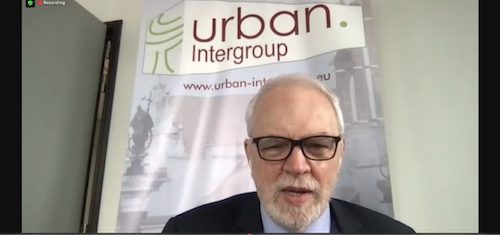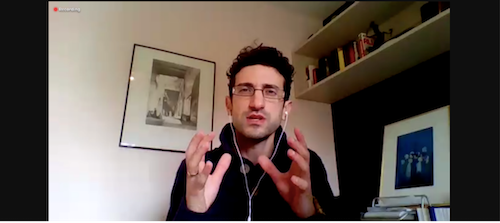European Parliament - URBAN Intergroup seminar on the Intelligent City Challenge
On 26 March, the URBAN Intergroup at the European Parliament held a seminar on the Intelligent City Challenge (ICC). The URBAN Intergroup is a cross-parties and cross-committees grouping at the European Parliament that discusses urban issues and brings together MEPs from all political parties. URBAN Intergroup’s overall goal is to ensure that urban-related problems are reflected in European Parliament’s decisions, so the ICC is delighted to have been invited and pleased to have been heard.
The panel discussion on the Intelligent City Challenge was chaired by URBAN Intergroup president Jan Olbrycht, who started by giving an introduction to the main purpose of the Intelligent Cities Challenge (ICC) programme and activities. Mr Olbrycht stressed the key role of cities and the good timing of the event. In the context of the Recovery and Resilience Facility (RRF), it was explained that a large part of funding is dedicated to the digital and green transformation, as well as the importance to use wisely this package to bring real change. This is also a key target for the ICC.

The Intelligent Cities Challenge was more elaborately presented and explained by Valentina Superti, Director of Directorate Tourism & Proximity, European Commission (DG GROW), who underlined the role of cities as building blocks for a human-centred, climate-neutral, and socially responsible industrial future. She presented the ICC initiative, which supports a community of 136 cities from 21 countries to drive a green, digital and socially fair recovery, making the most of innovation and technologies. She outlined four key deliverables from ICC:
- Local Green Deals, to be pursued through a LGD blueprint
- Cities of Excellence for Reskilling, with a Cities Guide for Reskilling
- Contribution to Renovation wave, Affordable Housing and New European Bauhaus
- Tech4Good initiative to promote technology-powered solutions and services.

The Intergroup seminar also included presentations from several participating ICC cities: Mohamed Ridouani, Mayor of Leuven; Akim Oural, Deputy Mayor of Lille and Delegate Counsellor of Lille Metropole in charge of digital policies; and Piero Pelizzaro Chief Resilience Officer and Sharing Cities City Lead at the City of Milan.
Mayor Ridouani of Leuven presented the Leuven 2030 initiative, and highlighted the value of the ‘quadruple innovation helix’ governance structure, where civil society organisations, businesses and local public authorities as well as higher education actors are empowered to co-create the vision fora digital and sustainable future for Leuven. This approach was echoed by other cities, like Guimaraes. The Portuguese city recently launched its +Greener platform, which is based on the same governing principles as Leuven 2030.

Deputy Mayor of Lille Akim Oural underlined the efforts of this city to concentrate on initiatives to attract and retain local talent through programs focused on the learning of digital and technology-related skillsets.
Mr Pelizzaro, represented a city hit hard by the COVID-19 pandemic and explained how the city stakeholders were induced by the pandemic to re-think Milan’s vision for the future and was positive about how the large amount of EU funds serves as a unique opportunity for local authorities to draw on new financing sources. This was also echoed by former MEP Michal Boni, who stressed the negative effect of the pandemic on municipal budgets and the need for closer collaboration among cities and national authorities in order to shape recovery plans in the right direction.
Another general point raised during the discussion was the need for measuring progress beyond GDP which is limited to economic indicators. On the contrary, according to Professor Mihail Diakomihalis from the city of Ioannina, the quality of life, environmental footprint and well-being of citizens should be essential factors for the allocation of funds to support a green, digital and resilient recovery. C.J. Walsh from Sustainable Design International Ltd. adds that we need to ensure that the ICC and other city-centred programs works for all citizens, including the most vulnerable groups such as migrants, people with disabilities and the poor, and contributes to making the digital sphere properly accessible to everyone.
Find more on the URBAN Intergroup here.


